
Journal of Insects as Food and Feed
Scope & Guideline
Unleashing the potential of insects for a sustainable tomorrow.
Introduction
Aims and Scopes
- Sustainable Protein Sources:
The journal emphasizes the role of insects as alternative protein sources for both human consumption and animal feed, highlighting the environmental benefits of insect farming compared to traditional livestock. - Nutritional Analysis:
Research published in the journal often includes detailed nutritional profiling of various edible insect species, assessing their macro and micronutrient compositions, and their potential health benefits. - Food Technology and Processing:
The journal explores innovative processing methods for insect-based foods and feeds, including techniques for improving sensory attributes, digestibility, and safety of insect products. - Ecological Impact and Waste Valorization:
Studies frequently address the ecological implications of insect farming, including waste recycling and the use of by-products from food production as substrates for insect rearing. - Consumer Acceptance and Market Trends:
Research includes consumer attitudes towards insect consumption, market potential, and socio-economic factors influencing the adoption of insects in diets. - Animal Welfare and Farming Practices:
The journal promotes research on best practices in insect farming, focusing on welfare considerations and sustainable production methods.
Trending and Emerging
- Nutritional Enhancement of Insects:
Research focusing on enhancing the nutritional profiles of insects through dietary modifications and biofortification is gaining momentum, reflecting an increasing interest in maximizing the health benefits of insect consumption. - Insects in Aquaculture:
There is a rising trend in studies exploring the use of insects as feed in aquaculture, particularly concerning their role in improving the health and growth performance of aquatic species. - Innovative Food Products Incorporating Insects:
The development of new food products incorporating insects, such as snacks, protein powders, and baked goods, is on the rise, indicating a shift towards culinary innovation and mainstream acceptance. - Consumer Behavior and Acceptance Studies:
An increasing number of publications are focusing on consumer perceptions, willingness to pay, and market dynamics related to edible insects, reflecting the importance of understanding market trends for successful commercialization. - Environmental Sustainability Assessments:
Research assessing the environmental impacts of insect farming, including life cycle analyses and sustainability assessments, is becoming more prevalent, highlighting the ecological advantages of using insects as food and feed.
Declining or Waning
- Traditional Insect Farming Practices:
There is a noticeable decline in research focusing on traditional methods of insect farming, as the field shifts towards more sustainable and technologically advanced practices. - Basic Taxonomy of Edible Insects:
Research centered on the basic taxonomy of edible insects seems to be waning, likely due to a growing emphasis on applied research that addresses practical applications and sustainability rather than purely taxonomic studies. - Historical Consumption Patterns:
Studies on historical consumption patterns of insects are becoming less frequent, possibly overshadowed by a focus on contemporary practices and consumer acceptance in modern markets.
Similar Journals
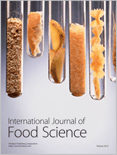
International Journal of Food Science
Delivering Cutting-edge Insights in Food ScienceThe International Journal of Food Science, published by HINDAWI LTD, stands as a crucial platform for advancing knowledge within the realm of food science. Established in 2013, this Open Access journal based in Egypt has garnered significant recognition, achieving an impressive Q2 classification in the 2023 Food Science category, which reflects its commitment to quality and impactful research. With a Scopus rank of #88 out of 389 in Agricultural and Biological Sciences and placing in the 77th percentile, this journal serves as an essential resource for researchers, professionals, and students dedicated to innovative developments and scientific exploration in food science. The journal not only provides unrestricted access to valuable research but also aims to foster collaboration and dissemination of knowledge on critical issues affecting food safety, nutrition, and technology. For those looking to keep abreast of the latest advancements, the International Journal of Food Science is certainly an indispensable addition to their academic pursuits.

Applied Animal Science
Elevating Standards in Animal Science ResearchApplied Animal Science, published by Elsevier Science Inc, is an esteemed journal that has quickly made its mark in the fields of Animal Science and Food Science since its inception in 2019. With an ISSN of 2590-2873 and an E-ISSN of 2590-2865, this journal has received commendable recognition, achieving a Q2 ranking in both categories as of 2023. Encompassing a broad scope that integrates cutting-edge research and practical applications, Applied Animal Science seeks to disseminate knowledge that advances the well-being of animal systems and food safety. Researchers and professionals in the agricultural and biological sciences benefit from its high-quality articles, which are ranked #152 out of 490 and #200 out of 389 in their respective fields according to Scopus rankings. While currently not open access, the journal remains accessible to a global audience of scholars eager to explore innovative findings and robust methodologies. As it continues to grow through 2024 and beyond, Applied Animal Science aims to be a pivotal platform for fostering knowledge exchange and inspiring future studies in its domain.
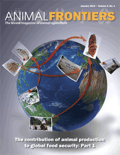
Animal Frontiers
Transforming Insights into Action for Animal WelfareAnimal Frontiers, published by Oxford University Press Inc, stands as a premier open-access journal dedicated to advancing the field of animal science and zoology. Since its establishment in 2011, this journal has garnered impressive significance, achieving a Q1 ranking in both Animal Science and Zoology and Food Animals categories as of 2023, placing it at the forefront of research in these critical areas. With a Scopus ranking of #25 out of 490 in Agricultural and Biological Sciences and an exceptional #4 out of 39 in Veterinary Food Animals, it caters to a diverse audience of researchers, professionals, and students dedicated to animal welfare, food security, and sustainable practices. The journal's mission is to provide a high-impact platform for innovative research and discussions that enhance our understanding of animal health and productivity globally. Proudly based in India, Animal Frontiers is committed to maintaining rigorous academic standards while ensuring accessibility to vital research findings, making it an invaluable resource in the scientific community.

Food Science of Animal Resources
Transforming Animal Science into Practical Solutions for TomorrowFood Science of Animal Resources is a prestigious, peer-reviewed journal published by the Korean Society of Food Science and Animal Resources, serving as a vital platform for disseminating advanced research in the fields of Animal Science and Food Science. Since its inception in 2018, the journal has quickly established itself with an impressive Q1 ranking in both categories for 2023, indicating its relevance and influence in the academic community—evident by its ranking of #23 in Animal Science and Zoology and #78 in Food Science among thousands of journals. Operating on an Open Access model since 2019, it enables unrestricted access to cutting-edge research for a global audience, facilitating collaboration and innovation. Its commitment to quality and rigor makes it an essential resource for researchers, professionals, and students dedicated to advancing knowledge in food safety, nutrition, and sustainable practices within the animal resource sector. Set against the vibrant backdrop of South Korea, the journal aims to bridge gaps in knowledge and foster communication among scholars and practitioners worldwide.
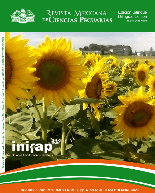
Revista Mexicana de Ciencias Pecuarias
Transforming Veterinary Practices with Cutting-Edge ResearchRevista Mexicana de Ciencias Pecuarias, published by INIFAP-CENID PARASITOLOGIA VETERINARIA, is a prominent open-access journal since 2010 that caters to the fields of Animal Science and Veterinary Medicine. Based in Mexico, this journal addresses critical issues in animal health, production, and welfare, making it instrumental for researchers, professionals, and students seeking to advance their knowledge and practices. With an impact factor that reflects its growing influence, particularly in the Q3 quartile rankings in both Animal Science and Zoology as well as Veterinary (Miscellaneous) categories, the journal provides a vital platform for the dissemination of innovative research and findings. Additionally, its Scopus Ranks position highlights its role in publishing significant contributions to the fields of Veterinary Science and Agricultural Biology. The journal fosters a collaborative learning environment through its open-access model, ensuring that valuable insights are accessible to a wide audience. For those committed to enhancing animal well-being and advancing veterinary practices, the Revista Mexicana de Ciencias Pecuarias stands as a key resource through its rigorous peer-reviewed publication process and commitment to scientific excellence.

Poultry Science Journal
Innovating poultry science through open access knowledge.Poultry Science Journal, with the ISSN 2345-6604 and E-ISSN 2345-6566, is an esteemed publication spearheaded by Gorgan University of Agricultural Sciences & Natural Resources since its transition to Open Access in 2013. Based in Iran, this journal serves as a vital platform for disseminating cutting-edge research and innovative advancements in the fields of Animal Science and Food Animals. With a current impact reflected in its Q3 quartile ranking within its categories and Scopus ranks indicating a competitive standing among peers, the journal plays a crucial role in enhancing the academic discourse surrounding poultry science. Researchers, professionals, and students alike are encouraged to engage with the journal’s high-quality content, which encompasses diverse topics including poultry genetics, nutrition, health, and welfare, thereby contributing to the improvement of poultry production practices globally. The journal’s commitment to accessibility ensures that valuable findings are readily available to the scientific community, fostering collaboration and advancing research in this essential domain of agricultural science.

Food Production Processing and Nutrition
Elevating understanding of food's role in health and wellbeing.Food Production Processing and Nutrition, published by SpringerNature, stands at the forefront of advancing knowledge in the vibrant fields of food science, nutrition, and public health. This esteemed Open Access journal, operational since 2019, plays a pivotal role in disseminating breakthrough research that intersects food production processes with nutritional insights, making it an invaluable resource for researchers, professionals, and students alike. With a commendable 2023 impact factor reflecting its robust scholarly contributions — Q1 in Food Science and Q2 in both Nutrition and Dietetics and Public Health, Environmental and Occupational Health — the journal not only emphasizes the importance of innovative food processing methods but also addresses pressing nutritional challenges faced globally. Located in the United Kingdom, it claims an impressive Scopus ranking, with a notable percentile standing across various categorical metrics. As such, Food Production Processing and Nutrition is essential for anyone aiming to deepen their understanding of how food systems impact public health through effective processing and nutritional strategies.
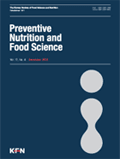
Preventive Nutrition and Food Science
Advancing the Science of Nutrition for a Healthier FuturePreventive Nutrition and Food Science, an esteemed journal published by the Korean Society of Food Science and Nutrition, serves as a pivotal platform for the dissemination of innovative research and insights in the fields of food science, nutrition, and dietetics. With an ISSN of 2287-1098 and an E-ISSN of 2287-8602, this journal is dedicated to advancing knowledge from 2012 through 2024, showcasing contributions that reflect the interplay between nutrition, health, and preventive strategies. Indexed in Scopus, it proudly holds a Q2 ranking in Food Science and a Q3 ranking in Nutrition and Dietetics as of 2023, positioning it among influential publications within these disciplines. Researchers, professionals, and students can explore cutting-edge studies that contribute significantly to evidence-based practices, enhancing public health and nutritional care. Although it operates under a subscription model, the journal plays a crucial role in fostering a deeper understanding of preventive nutrition, advocating for advancements that address contemporary dietary challenges.
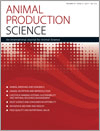
Animal Production Science
Pioneering Research for Sustainable Animal PracticesAnimal Production Science, published by CSIRO PUBLISHING, is a prestigious journal that caters to the fields of Animal Science and Food Science. With an ISSN of 1836-0939 and an E-ISSN of 1836-5787, the journal features high-quality research and reviews that are crucial for advancing the understanding and innovation of animal production systems. Recognized within the Q2 category of both Animal Science and Zoology, and Food Science, as per the 2023 Journal Rankings, Animal Production Science has achieved commendable Scopus rankings, placing it in the 68th and 48th percentiles in its respective categories. With converged years from 2009 to 2024, and an aim to disseminate knowledge that promotes sustainable practices, the journal is pivotal for researchers, professionals, and students devoted to animal production and food security. Exploring topics from livestock management to food quality, the journal offers valuable insights for enhancing productivity while considering welfare and environmental impact. For those seeking accessibility, the journal provides various open access options, encouraging a wider reach of its scholarly articles.

Future Foods
Shaping the next generation of food technologies.Welcome to Future Foods, a cutting-edge academic journal published by Elsevier, dedicated to advancing the field of food science. As a prestigious Q1 journal in the Food Science category, it ranks impressively as #43 out of 389 in Scopus, placing it in the 89th percentile among its peers. Future Foods aims to explore innovative developments in sustainable food systems, novel food products, and the intersection of technology and food production, thus providing a platform for research that addresses global challenges such as food security and nutrition. With its focus on future-oriented solutions and trends in the food industry, this journal is essential for researchers, professionals, and students who are eager to contribute to the discourse around cutting-edge food science. Situated in the Netherlands, the journal serves the international academic community and fosters collaboration and knowledge sharing in the realm of food innovation.